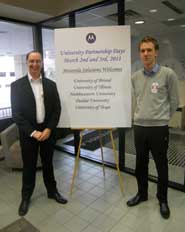Professor Andrew Nix (Head of the Department of Electrical and Electronic Engineering) and final-year PhD student David Halls visited Motorola’s head office in Chicago for the two-day conference last term. The ‘University Partnership Days’ were an opportunity for members of Motorola’s ‘University Partnership’ programme to present and discuss their latest research. The conference marked the end of the first year of this scheme. The University of Bristol is the only UK university involved, alongside the University of Texas, Perdue University, the University of Illinois and Northwestern University from the US.
The topics covered during the first day included interference alignment, interference pricing in multi-antenna networks and downlink capacity and co-ordination techniques in heterogeneous networks (HetNets). The second day covered 60-80GHz wireless backhaul alongside Bristol’s topic of ‘green’ basestations presented by Professor Nix, who summarised the CCR’s collaborative work with Motorola in Swindon. The project, which is being undertaken by a team of academics, research associates and MSc students, includes energy-efficient MIMO antenna design, energy-optimised packet scheduling and antenna beamforming for cell-edge enhancement.
Professor Nix said: ‘Our green radio project will radically enhance the energy efficiency of pico basestations. By 2020 these devices have the potential to offer 1,000 times more data capacity and at a fraction of the energy consumed by today’s cellular infrastructure.'
David Halls, whose PhD is sponsored by Motorola UK, presented a paper on interference characterisation and management in mobile broadband networks. Halls said: ‘This event has shown me the commercial value of my research. It was amazing to learn, network and receive feedback from such a distinguished panel of North American experts.’
Each university presented for an hour, followed by a matching Motorola talk and Q&A session. The conference ended with a panel session to debate the topic ‘key technologies to meet the capacity crunch imposed by future devices and services’. The CCR representatives were then given a tour of Motorola’s research labs, which included a demonstration of its cutting-edge LTE (4G) technology.
